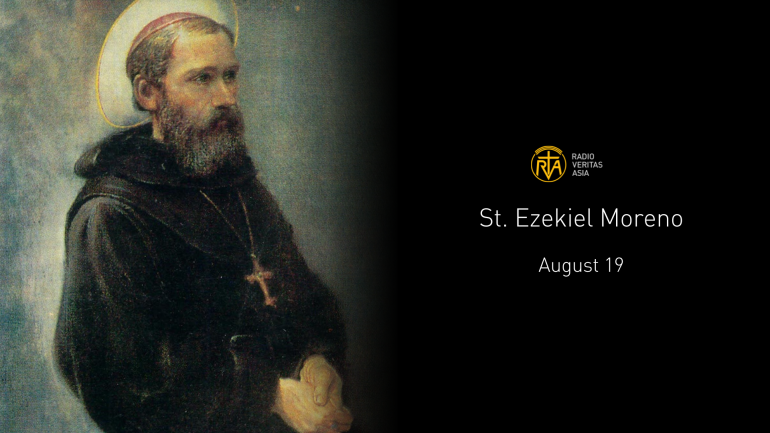St. Ezekiel Moreno: A missionary’s legacy of faith, compassion, and healing across continents

Every August 19, Catholics worldwide pause to celebrate the feast of St. Ezekiel Moreno, a revered figure whose legacy resonates profoundly, particularly in the Philippines and Colombia.
But who is this saint, and why does his name continue to echo in the hearts of the faithful in these regions?
Born on April 9, 1848, in the modest town of Alfaro, La Rioja, Spain, Ezekiel Moreno’s early life was marked by the virtues of obedience, love, and diligence.
Raised in a household deeply rooted in faith, Ezekiel displayed an early commitment to his spiritual journey.
Following in the footsteps of his elder brother, he entered the Recollect congregation of the Augustinian Order in Monteagudo, Spain. This decision set him on a lifelong path of unwavering devotion and service.
In February 1870, after completing his seminary studies and professing his simple vows, the young friar, along with 17 fellow missionaries, embarked on a mission to the distant shores of the Philippine Islands.
Just over a year later, on June 5, 1871, Ezekiel Moreno was ordained as a Recollect priest. Thus began a remarkable 15-year ministry that would see him traverse the islands of Mindoro, Palawan, and Luzon, bringing the light of the Gospel and the warmth of pastoral care to countless communities.
Ezekiel’s dedication as a missionary was evident in his deep immersion into the local culture of the Philippines. He diligently learned Tagalog to better serve the people of Mindoro.
His time in Palawan, especially in Talisay, left a lasting impact, with stories of miraculous healings attributed to a well he dug for the community.
This act of compassion foreshadowed his later designation as the patron saint of cancer patients, a testament to his lifelong care for the sick and suffering.
In 1885, Ezekiel was recalled to Spain, where he served as the Rector of the College and Novitiate in Monteagudo.
However, his missionary zeal was far from extinguished. Three years later, he was sent to Colombia, where he faced the monumental task of revitalizing the Augustinian Recollect Order and reactivating the old Mission Province of Candelaria.
His work bore abundant fruit, rekindling the faith of many and solidifying his reputation as a tireless servant of God.
In 1893, Ezekiel Moreno was appointed Apostolic Vicar of Casanare, and just a year later, he was named Bishop of Pasto. His leadership during the tumultuous years of the Colombian War (1899–1902) showcased his courage and unwavering dedication, as he became a beacon of hope and strength for his flock.
Even the most faithful servants face trials, and in 1906, Ezekiel was diagnosed with cancer, a disease that would ultimately claim his life. Despite his suffering, he continued his mission until he was advised to return to Spain for treatment.
On August 19, 1906, in the quiet of the Monteagudo convent, St. Ezekiel Moreno peacefully surrendered his soul to the Creator he had so faithfully served.
His canonization in 1992 by Pope John Paul II affirmed what many already knew: St. Ezekiel Moreno was a model of pastoral fidelity and missionary zeal whose intercession continues to inspire and heal.
In Puerto Princesa, Palawan, the legacy of St. Ezekiel lives on, not just in the hearts of the faithful but also in the very streets they walk. Taft Street, now renamed St.
Ezekiel Moreno Street, stands as a daily reminder of the saint who once celebrated the first Mass in the city over 150 years ago. His statue, outside the Immaculate Conception Cathedral, serves as a testament to a life dedicated to God and His people.
Bishop Socrates Mesiona of Puerto Princesa, who petitioned for the renaming of the street, encapsulated the sentiment of many when he said, “Naming a street in his honor will surely help perpetuate his significant contributions as recorded in our history.”
As we reflect on the life of St. Ezekiel Moreno, we are invited to remember the values he embodied: faith, compassion, and unwavering dedication to the mission of the Church.
His story is not merely a tale of a life well-lived; it is a call to each of us to live with the same fervor and faithfulness.
Radio Veritas Asia (RVA), a media platform of the Catholic Church, aims to share Christ. RVA started in 1969 as a continental Catholic radio station to serve Asian countries in their respective local language, thus earning the tag “the Voice of Asian Christianity.” Responding to the emerging context, RVA embraced media platforms to connect with the global Asian audience via its 21 language websites and various social media platforms.













